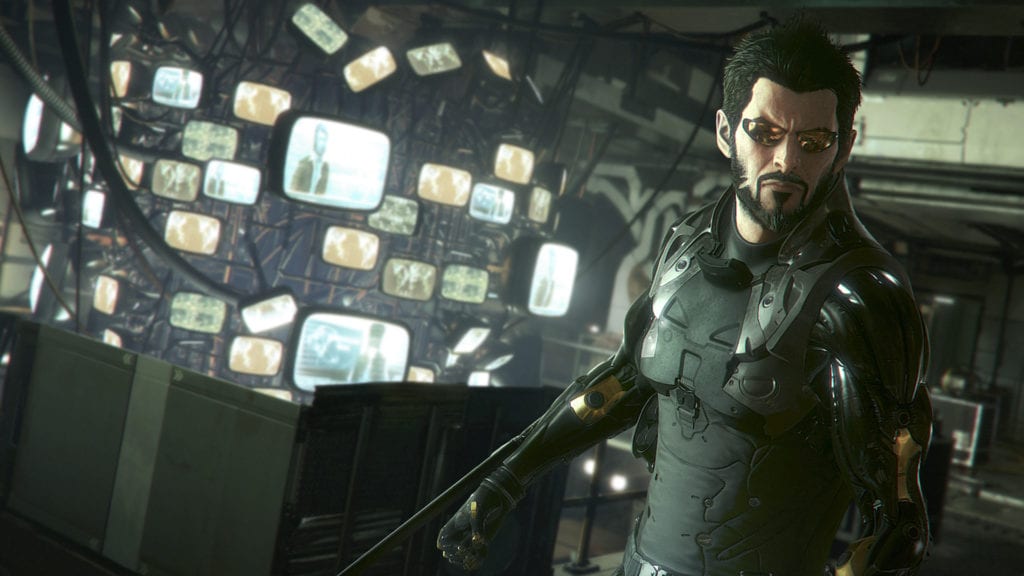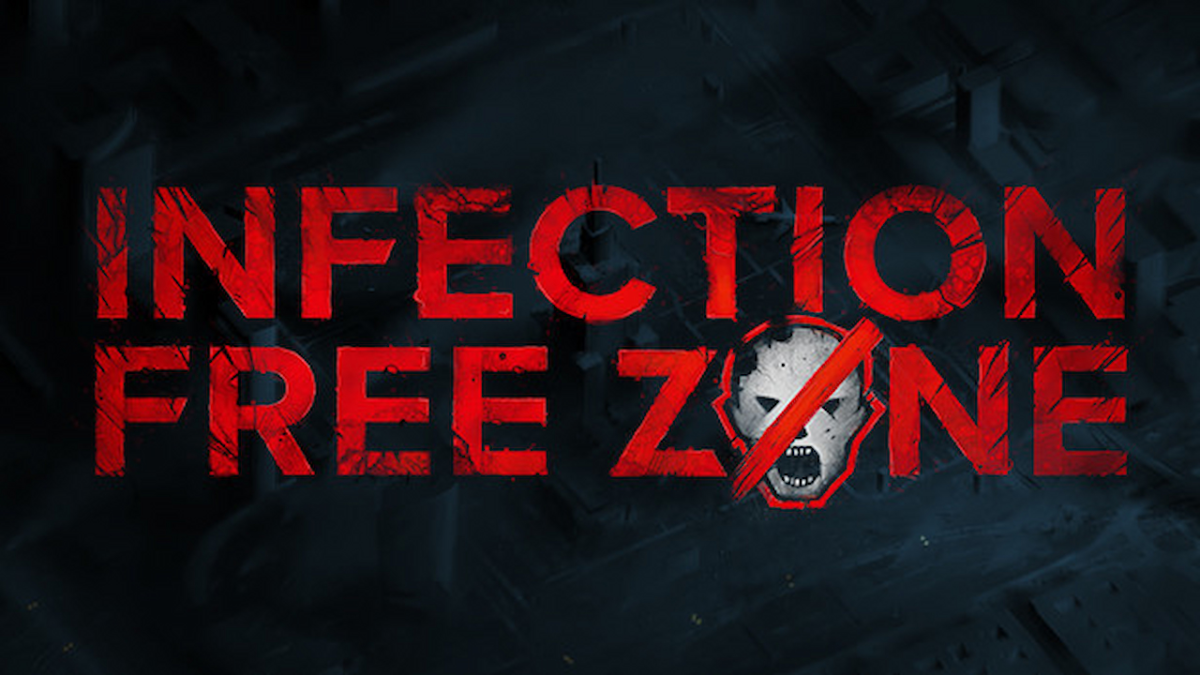It’s easy to forget that prior to its release, Deus Ex: Human Revolution was subject to a withering bout of fan cynicism. The big-name publisher best known for Final Fantasy, a cross-platform release (still considered dubious in 2011, especially after Invisible War’s console-related problems), and protagonist Adam Jensen’s passing resemblance to SomethingAwful meta-reference Johnny Five Aces all drew suspicious glances from people fearful of a series-deaf reboot. To everyone’s relief, Human Revolution turned out to be a title which demonstrated concise understanding of Deus Ex’s emphasis on adaptive player choice and open-ended level design. Then it topped it all off with some outstanding cyberpunk-via-the-Renaissance art direction and Michael McCann’s superb score.
We’re now five years on, and Deus Ex: Mankind Divided is arriving on a wave of expectation, rather than cautious misgivings. It’ll meet the majority of those expectations, particularly in regard to continuing Eidos Montreal’s meticulous dedication to creating unique, detailed levels the corners of which many players may not even see. McCann returns too (accompanied by new co-composer Sascha Dikiciyan), resulting in another absorbing score. But this title deviates somewhat from the globe-trotting, grand conspiratorial structure of the prior games, instead attempting a more localised investigative plot with implications and external manipulations that reach beyond its narrower geography. Where Human Revolution saw Jensen chasing answers everywhere, Mankind Divided takes place at the apex of a conspiracy.

Part of the NDA is having to use Square Enix provided images. Sorry about that. This great Versalife pharmaceutical advert is something I actually wanted to show, though.
Mankind Divided’s main hub, Prague, is split across two subway-as-loading-screen linked areas. The larger of those areas is a comfortable equivalent to the Detroit city streets in Human Revolution, but that kind of direct size comparison would ignore the much greater density of diverse architecture, quest activity, and vertical exploration (both up and down) to be found in Prague. Pretty much every building named on the map is guaranteed to have some sort of associated mission or side-quest during the course of the game. And from high-tech banks to cultist churches to simple storage areas or apartments, they all have curated design. Enter any one of the half-dozen or so apartments in Jensen’s building and you’ll find something novel, interesting, or relevant to the world at large.
The trade-off for this compelling variance in design is that Prague is not just Deus Ex: Mankind Divided’s main hub, it’s really the game’s only hub. Golem, essentially a set of wretched, segregated housing pods for Prague’s now-ostracised and state-oppressed augmented people, comes closest to a second hub-like area, but is really more like an extended two-part mission with an exploratory prelude. The rest of Jensen’s out-of-town activities take place as stand-alone assignments, similar to the Highland Park compound or Picus buildings in Human Revolution.
Two years on from the events of Panchea, a thoroughly jaded Jensen now works for a task force branch of Interpol called TF29. Mankind Divided amalgamates the various choices from the end of the prior game into a set of accepted truths: Panchea was destroyed, a portion of Hugh Darrow’s message got out, and augmented people across the world temporarily lost control of their actions and lashed out in an often deadly fashion. Prague, by 2027 a corporate-friendly tech haven full of people with augmentations, is now (2029) a test case for legislated, state-sponsored segregation, oppression, and, at its most extreme, forced relocation or expulsion of augmented people.
After a Dubai-based tutorial operation comes to a perplexing conclusion, Jensen returns to Prague and is caught up in a station bombing (that shouldn’t be too much of a spoiler, it happens early and was all over promotional materials). The game’s opening sequences pile on a lot of information at once, as well as setting up the game’s two driving mysteries in quick succession. As a result it feels a little muddled and has some pretty clunky exposition (“Ah yes, the leader of the hacktivists”), but it does wind up feeding quite neatly into both the more localised geographical focus of Mankind Divided and Jensen’s side-lining at Interpol.
He’s forced onto the less juicy bombing case by boss Jim Miller, setting the game up as a bit of a detective crime drama (albeit one with an augmented super-agent). Jensen’s investigations clash with corrupt police, and his own augmented nature throws up plenty of obstacles. There’s prejudice at his work place, in the form of unrepentant arsehole Duncan MacReady (Peter Serafinowicz in full sneering mode) and Jensen’s delegation to the relatively thankless bombing case. Outside, the repeated snipes are worse, from paperwork-obsessed cops who’ll check Jensen’s credentials whenever he dares step into the subway line for ‘naturals’, to unpleasant NPC citizens who assume he’s always looking for a hand-out. The latter isn’t necessary, of course. As Deus Ex players will know, Jensen is quite capable of self-finance by swiping every single unattended credit chip he stumbles across.
Oppression of the augmented is a persistent presence in the game’s narrative, and while the commentary on people marginalised by state politics isn’t always sure whether it wants to be background setting or incisive political allegory, Mankind Divided does enough to make you, as Jensen, feel like an unwanted, distrusted minority. That’s a bold and unusual step for a medium that normally goes out of its way to make the hero (especially in an action-oriented game) feel borderline messianic, so the novelty alone is enough to make it feel effective here.

Golem: a wonderful home-away-from-home for the augmented. And definitely not a military prison complex.
Level design in Deus Ex: Mankind Divided matches (and at some points arguably exceeds) the high standards set by Human Revolution. The game may force you to become awfully familiar with the Prague hub, but the diversity in building types is such that the same street may house a posh bank and an underground, sewer-based crime den. Both very different in style and encouraging varied approaches.
As you’d hope, every mission map (indeed, every floor of every mission map) offers Jensen multiple ways to achieve his goals; both in manner (stealthy or violent) and traversal (through vents, weaving behind cover, popping into a handy lift for which you found a keycard). Hacking returns in a slightly expanded form, as there are now specific pieces of software for removing a ‘fog of war’ effect over the circuitry, speeding up the take-over of nodes, or sneaking through firewalled zones. If you didn’t love this mini-game first time around, the new version is unlikely to change your mind. But the return of multi-tools (which can easily be purchased, or slightly less easily ‘crafted’ from spare parts under another new mechanic) means there’s even an alternative solution here too.
Crafting parts are a new pick-up that can be found by exploiting Jensen’s latent kleptomania and, as well as being funneled into creating new biocells and the like, can be used to partially upgrade weapons. Attachments like red-dot lasers and silencers are still out there in the world, but more marginal aspects like boosted damage and alternate firing modes are now unlocked via crafting. This works fine, though there wasn’t a whole lot wrong with the purely mod-based system of weapon improvement so this (aside from having the option to magic an emergency multi-tool from nowhere) feels a bit like minor change for the sake of it.
Since this is a sequel, Mankind Divided finds the inevitable videogame way of resetting Jensen’s Praxis-powered augs within the opening chapters. For something so inevitable, it does this in a fairly smart manner, and also finds a way to tie-in a number of new augmentations that our tight-bearded hero can adopt. Jensen is now able, among other things, to briefly slow time, perform a camera-dodging ‘Icarus Dash’, fire wrist-blades into people’s faces, and (something I got a lot of use from) remotely hack certain in-world devices like drop-down ladders, window shutters, and pesky drones.
As well as broadening the moment to moment tactical options through these additional augmentations, Deus Ex: Mankind Divided slightly rejigs its third-person cover system, making it easier to scamper between barriers or change position when under fire. It can still be a little rough at times (the PC review build currently has an annoying bug where pressing Space to register a reloaded save will count as pressing Space to immediately leap Jensen out of cover), and the toggle-able positional indicators don’t always offer you the movement option you’re hoping for. But as an incremental change from Human Revolution’s system it can be said to be an improvement.
If you do opt to go with outright confrontational violence, you’ll need to be equipped for it. A squishy, stealth-oriented Jensen won’t stand up to the attentions of alerted guards (who now swarm on your position with hyper-vigilance) for more than a few seconds. The Prague police have invested in exo-suited cops who can’t just be shoulder-tap stealth-punched into submission (unless you EMP them first), and augmented foes, while by no means equal to Jensen, have stealth and traversal options in their arsenal. Deus Ex has always leaned towards covert agents being more fragile, and this installment really hammers the necessity for actively pursuing a combat build if that’s your chosen path (based on my experiences in the default ‘Give Me a Challenge / Normal’ difficulty).
The game impresses too with its ability to track and appropriately react to Jensen’s actions during missions. Balls up part of the opening tutorial operation (as I managed, in spectacular fashion) and your colleagues will chew you out. This did go amusingly wrong on one occasion when I was falsely accused of going on some kind of psychotic rampage (I’d actually killed nobody and knocked out one guy), but otherwise Mankind Divided made regular, admirable reference to choices made throughout. There are multiple branching quests, and a myriad of side missions; some of which you may not even come across. Discussing the game with fellow PC Invasionite Tim McDonald, I learned of a handful of missions I’d not even discovered. Some due to making different, earlier choices, another that I’d simply not encountered.
The game’s conclusion (again, no specific spoilers here, don’t worry) has a terrific, Alpha Protocol-esque method of recapping and showing longer-term consequences of some of Jensen’s key decisions. And the denouement itself is a lot more meaningful in terms of reflecting a culmination of choices than Human Revolution’s button pushing. As the ‘Director’s Cut’ of that game already showed, Eidos Montreal learned their lesson with boss fights (and they’re generally reduced in number for this game). The conversation ‘battles’ also return, making certain stand-offs tense affairs.
On top of that, Deus Ex: Mankind Divided is a game kind of in love with extras and cross-over knick knacks. You can collect triangle codes to scan into a separate app for (presumably) some reward. There’s a separate, pre-order based mission called Desperate Measures under a stand-alone menu option called ‘Jensen’s Stories’, which is clearly intended to provide a handy method of offering new, future DLC levels that may not directly tie-in with the main story. Desperate Measures (a 30-some minute outing in which Jensen infiltrates a private security firm building) would actually have fit in just fine with the Prague narrative; so that was either finished late in the day, left aside specially for the pre-order thing, or was felt to interrupt the pacing when in-game.
The main game also has collectible (breach software) for yet another bonus bit, a stand-alone, time-attack style game called Breach. This basically uses the same cover, movement, and remote hacking aspects as Mankind Divided itself, but frames everything as a virtual world inside a bank’s server system. You have to grab the data, avoid (or destroy) virtual guards, and get out as fast as possible. It’s alright, but also full of slot machine ‘card pack’ rubbish and primed for microtransactions. Still, if that’s the way the Eidos Montreal team are able to keep that sort of nonsense out of the main game, then Breach is performing a noble service. Update: Seems that’s not the case and the main game has a shitty microtransaction shop too (inactive in the review code). That sucks.
PC Invasion will be running a stand-alone article looking at the specific PC options and performance in more detail around release day (certain irritating embargo rules prohibit me from doing this earlier) Update: You can read that now. However, the short version is that Nixxes are on porting duties for this one and have a justifiably solid reputation for this kind of work. There are an extensive list of graphics options to alter and customise, support for borderless and exclusive fullscreen, MSAA, the ability, thank christ, to turn off the hideous sharpening and chromatic aberration effects that you see on all the canned promotional images I’m NDA-limited to using in this review, an FOV slider that takes the game’s field of view from the default (awful) to a much more acceptable level, and the list goes on.
You can substantially customise the HUD too, switching off things like waypoint markers, the mini-map, fading out your health when not in use, tweaking the scale of the HUD so that it’s 20% or 50% (or really any percent) smaller. Keys can be redefined. Mouse sensitivity altered. It’s a really strong transition to PC, where Deus Ex: Mankind Divided will without question look and run its best (quality of your PC permitting, of course). Performance-wise the game is said to still be undergoing optimisation, but I don’t expect radical changes between now and release.
On a system housing an i5-6600 / 16GB DDR4 RAM / 4GB 380X, Mankind Divided defaulted to High (out of Low/Medium/High/V. High/Ultra). That proved to be a little over-taxing for a consistent 60fps/1080p, but lowering Shadows to Medium and just putting up with a few fluctuations seemed to work out fine. With V-Sync off, tighter indoor areas were comfortably in the 50-70fps range. Most outdoor areas hovered closer to 45-60, with a few particularly geometry-heavy areas of Prague dipping briefly into the high 30s.
Again, that’s not final performance, but my impression is that if you’re below the recommended specs, expect to be running at least some settings at Medium or even Low. Or to make compromises on frame-rate or resolution.
The moment to moment mechanics of Deus Ex: Mankind Divided are driven just as much by player agency as they were in Human Revolution, and the Prague hub is denser and better-looking than Detroit or Hengsha. But basing 80-90% of the game there (probably by necessity, creating all of these unique building settings must be both costly and time-consuming) does mean Mankind Divided feels like it’s taking place within a much more compact space than the prior game. Though the hand of the Illuminati is most certainly present throughout, the narrative ends up feeling more localised; in part because several strands of the plot are left unsolved.
This gives the game a distinct feeling of being a ‘Part Two’ in an as-yet-uncompleted trilogy. A third Jensen Deus Ex game would be fantastic, especially as Eidos Montreal are one of the few developers (along with Arkane) afforded a decent budget for this type of first person, story-heavy single player RPG. But until that hypothetical trilogy actually happens, the unresolved stuff in Mankind Divided (which is by no means short, it took me 25 hours and I know I didn’t see everything) are just disappointing loose ends. Ultimately, you don’t feel as if you’ve achieved as much as you really should.
Some narrative pacing, spots of voice acting that are either mixed poorly or are delivered flat, and that feeling of part-twoism aside, Deus Ex: Mankind Divided is the equal or better of Human Revolution in many spots. It makes less of an impact simply because it’s an incremental improvement, rather than the seismic sigh of relief that greeted Human Revolution’s rejuvenation of the series. Deus Ex: Mankind Divided is a strong follow-up that reinforces the majority of the series’ pioneering strengths, but doesn’t quite dislodge its predecessor as the top-placed Jensen jaunt.
If you have started playing, make sure you also check out Deus Ex: Mankind Divided Guide – Hints & Tips for New Agents.









